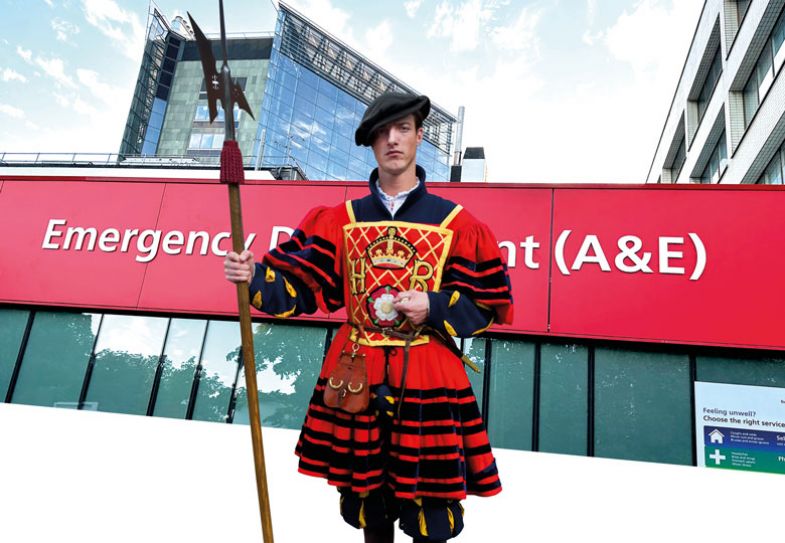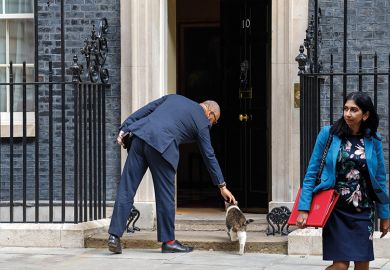“Scientists who are single can just about survive on a postdoc’s salary: they can live in shared accommodation. But it’s much more difficult when you have a wife and family,” reflects molecular biologist Shashi Singh on the financial pressures faced by thousands of researchers in UK academia. For Singh, a senior research associate at the University of Glasgow’s School of Infection and Immunity, that challenge has been exacerbated by the steep visa fees and surcharges to use the National Health Service that he has been required to pay during his seven years in the UK.
“Last month, I paid £6,000 for settlement of my wife and daughter. When postdocs’ salaries are around £40,000 a year, or £35,000 if you’re a new starter, that’s a huge strain on your family budget,” says Singh, who did his PhD at the prestigious Indian Institute of Technology, Madras, where graduate acceptance rates are less than 4 per cent.
The need to save for such significant payments to the Home Office means that his family miss out on things that they might reasonably expect, admits Singh: “We have to choose which parties my seven-year-old son goes to. We don’t have a car, so if the party is a few miles away, I know that’s going to cost £15 to £20 in taxi fares. That money is needed to buy food or has already been used to pay for visas. I’ve tried walking with him but it’s a long way for a young child, so sometimes we just don’t go.”
Having to make such sacrifices is taking its toll, admits Singh, who is considering pursuing his academic career elsewhere or looking for higher-paying roles outside academia. “The amount of money I’m earning isn’t enough to live a good life or to give my family a good life,” he says.
For many international staff in UK universities – of whom there are about 105,000, according to the Higher Education Statistics Agency (Hesa) – life is about to get even harder. Next month, plans to raise the NHS surcharge from £624 to £1,035 for main applicants – announced by Rishi Sunak in July – are expected to take effect. That follows a 15 per cent hike in fees for work visas in October, which now cost between £715 and £1,500 for a three-year Tier 2 Skilled visa.

Having obtained settled status, Singh himself will not be hit by those uplifts. But an international researcher in his situation – with a wife who cares for their two children – will now have to pay a colossal £23,791 for a five-year stay, up from £15,880, which was already the highest in the world by some distance. Those costs – about £4,700 a year, or almost £400 a month – represent about one-sixth of the take-home pay of a researcher earning £35,000 a year.
“It’s a huge chunk of your income when you consider that many researchers will have a family they will want to bring with them,” says Alison Noble, the Royal Society’s foreign secretary, a post that she holds jointly with the UK’s former chief scientist Sir Mark Walport. “They might already be carrying significant debt with them from graduate study,” adds Noble, who is Technikos professor of biomedical engineering at the University of Oxford.
With the global battle for scientific talent fiercer than ever, the UK must “consider ways to reduce these costs if we’re going to compare favourably to our global competitors. We’ve already been impacted by Brexit, and while [the eventual agreement of] Horizon Europe membership was extremely welcome, international scientific collaboration is about moving global talent between countries and these charges won’t help this to happen,” Noble says.
Universities UK has echoed the point that the government’s professed aim to establish a competitive immigration system capable of attracting world-class young researchers will be “severely tested” by the latest fee hikes. And even George Freeman, the UK’s boosterish science minister until he stepped down in the recent reshuffle, has hinted that such costs are problematic, telling the Conservative Party conference in September that the UK cannot become a science superpower behind a “visa wall”.
Some universities, such as UCL, have begun to pay visa fees for recruits from outside the UK, as well as for in-country applicants. Others offer interest-free loans to international staff that are deducted from monthly pay cheques, usually over three years. However, such support is not offered by all institutions, and staff have to cover dependants’ costs and NHS surcharges on their own in most cases.
For Noble, this “raises the concern that some universities can afford to pay these costs but others can’t”. And even for those that can afford to pay, such costs are becoming a “huge expense”, on top of all the other financial challenges they currently face.
Even back in 2019, a study by EY estimated that Russell Group universities were spending about £300,000 each on supporting immigration applications for their staff and a further £712,000 for their students, totalling an annual £25 million across the 24-strong group, including £6.4 million paid directly to the government. The consultants expected that figure to increase to £34 million by the end of 2022, given the requirement, from 2021, for European Union citizens to pay visa fees, too, but that figure now looks optimistic as it did not anticipate the recent hikes in fees.
Lowering visa fees for researchers is “one of the easier answers” to the challenges of attracting and retaining overseas staff and students, Noble suggests.

The sector’s pleas have not gone entirely unheeded. Under Boris Johnson’s premiership, the government created the Global Talent visa, designed to provide a lower-cost “accelerated path” to settled status for top researchers. Under this scheme, used by about 6,000 figures in academia and technology since its launch in February 2020, indefinite leave to remain can be obtained within three to five years (compared with the standard 10), after which a bid for citizenship can be made. But immigration experts have warned that many applicants don’t qualify for the Global Talent visa, meaning that employers push would-be staff down the higher-cost Tier 2 Skilled visa route to avoid rejection.
“If you want to apply for a Global Talent visa, you need to have your PhD, but many applicants are still finishing up or waiting for their viva,” explains Sarion Bowers, head of policy at the Wellcome Sanger Institute in Cambridge. “That’s a huge issue because most PhD students don’t have the vast resources needed to go down the Tier 2 route – for those in low- to middle-income countries, these costs are astronomical.”
In addition to the cost, those negotiating the “very complicated” UK visa application system are often reluctant to go down the Tier 2 route because “the Skilled Worker visa ties them to the Sanger”, continues Bowers, requiring them to make an entirely fresh visa application if they wish to move to a different organisation.
“I don’t think the current [political] rhetoric about immigration is helping either. We say we want to be a ‘global science superpower’, but the message sent out is very different,” says Bowers, who estimates the Sanger’s annual spend on visa-related costs at about £300,000, which includes the employment of two full-time staff to facilitate applications. The UK’s imposition of such uniquely high fees also undermines the “reciprocity” of the international exchange of researchers, she adds.
Many observers see the apparent gap between word and deed in the UK’s science and innovation strategy as symptomatic of long-running tensions between, on the one hand, the Department for Education and the Department for Science, Innovation and Technology, which typically push for more attractive visa regimes for students and academics respectively, and the Home Office, which is focused on reducing immigration. Indeed, Rogelio Braga, a Filipino PhD student at Birkbeck, University of London, sees the latest fee hikes as being of a piece with the so-called hostile environment migration policies launched when Theresa May was home secretary a decade ago.
“It is a dehumanising way to make money from black and brown bodies through extortionate charges,” says Braga, a board member of London-based charity the Joint Council of Welfare for Immigrants. “One man I’ve met hasn’t seen his wife and children in Pakistan since 2019 because the visa costs are so high and he refuses to allow his family to become undocumented migrants.”
Many international master’s students will also have to live separately from their families from this month, following a ban on bringing dependants with them – although research postgraduates are still permitted to do so.
There are already signs that international academics are more open to leaving than they were in the pre-Brexit era, says James Walker, director of the World of Work Institute at the University of Reading’s Henley Business School, whose recent study into the attitudes of nearly 500 academics in business and economics found that just over half were considering whether to move abroad, with the temptation greatest among younger scholars without children.
“A number of my colleagues have already moved back to Europe and they are often the best academics,” says Walker, who adds that his discipline is particularly exposed given its high dependence on European staff.
“There isn’t a big pool of UK scholars in many disciplines – in the year that I finished my doctorate, there wasn’t a single economics PhD awarded to a British candidate in the whole of London,” says Walker, who is originally from New Zealand. “The UK is a research powerhouse, but we’re highly reliant on international staff, particularly those who come here to do their PhDs. So making it more difficult for them to stay here is a mistake.”
Nor should the effect of the fees rises on the UK’s international student market be underestimated, warns Patricia Nabuco Martuscelli, lecturer in international relations at the University of Sheffield. That market is worth an estimated £42 billion to the economy, according to a report published jointly by Universities UK International (UUKi), the Higher Education Policy Institute (Hepi) and Kaplan International Pathways in May. However, the cost of a study visa rose by 35 per cent in October – up to £490 for out-of-country applicants – while the NHS surcharge is set to rise from £470 to £776.
There are early signs that recruitment in some disciplines at Martuscelli's institution is not as buoyant as expected, she says: “Universities should be more concerned about how these migration policies are likely to affect one of their main sources of income.”
For one London-based business studies lecturer, who does not wish to be named, the impact of the student fee hikes is already becoming very clear. “I teach marketing two days a week, but I’m having to go down to half a day a week because my university’s student recruitment agents missed out on a deal to bring two big groups – several hundred international postgraduates in total – to us, citing the rising costs of visas,” he says. “It is ridiculous to see a market that creates so many jobs being hurt like this.”
Glasgow’s Singh is not alone in feeling that if such high visa and NHS fees must be paid, they should come out of institutional coffers, however much strain it might impose on already fraught cash flows. “When UK universities are marketing themselves on [the basis of] their international staff and the ‘international experience’ that overseas students will enjoy, it’s not fair that they don’t pay the costs that this entails,” says another Indian-born researcher, who has paid about £12,000 in visa costs on her journey from master’s student to permanent lecturer at a leading London university.
“That’s the cost of taking a master’s degree for an international student,” she reflects. “When universities have surpluses running into millions of pounds, they should be paying these costs in full for their staff. But different universities have very different support packages.”
At the time of the 2019 EY study, only half of Russell Group members routinely covered immigration fees for main applicants, and none did so for dependants, although 80 per cent provided loans, the study also found. Those figures do not surprise Singh, who believes that universities have found it easy to overlook the costs faced by their hard-up international researchers.
“Most researchers are hired on grants, so the external funder will often pay the visa fees for the university,” he says. When the funding expires or is renewed, the costs then usually fall to the researchers themselves, he adds.
The inconsistency in support for visa costs between institutions may also explain why – despite Universities UK’s representations to Westminster, including giving evidence to the House of Commons Science and Technology Committee in September 2022 – universities have been “very muted” on the visa cost issue, in the opinion of the Indian lecturer.
But it seems doubtful whether any amount of sector lobbying would persuade the government to reverse its tough line on immigration. Indeed, the NHS surcharge hike has been a useful political tool for prime minister Sunak, who claimed that the extra revenue will fund pay rises for thousands of public sector workers, including NHS staff; some saw this as a canny way to dampen criticism from the anti-migration New Conservatives group of MPs, who have suggested the health surcharge should increase to £2,700 per person per year, four times its current rate, to deter immigration. Robert Jenrick, the immigration minister, later told the New Conservatives that the health surcharge would directly fund Home Office efforts to cut immigration.
Meanwhile, the government has denied that it is profiteering from visa fees. An analysis by The Times in September found that the Home Office was making a £1,349 profit on a standard £1,500 three-year Tier 2 Skilled Worker visa and £2,884 from Route to Settlement fees for dependent relatives. But the government responded that the £1.9 billion raised by visa fees last year is vital to ensure that the UK’s migration and borders system, including the £3 billion asylum system, is “sustainably funded”.
While the Labour Party has not set out a policy on visa costs, its leader, Sir Keir Starmer, used that same phrase during a parliamentary debate in 2016, when he was shadow immigration minister. “It is right that the [immigration] service is sustainably funded rather than being funded by the taxpayer,” he commented. However, Starmer also raised the injustice of the NHS surcharge being levied on low-paid NHS workers during the early days of the pandemic in 2020, and Sir Stephen Timms, the Labour MP for East Ham, who has tabled an early day parliamentary motion to debate the forthcoming surcharge increase, believes there will be a “very different – and sympathetic – set of ears in the [Labour] party” if, as looks probable, it wins power in next year’s general election.
“Some people seem happy because they think [the price increases are] a ‘free hit’ on migrants,” says Timms, a former Cabinet minister under Tony Blair and Gordon Brown. However, “these migrants are already paying taxes to support the NHS and other services, so it’s hard to see the justification for charging them again.”
Glasgow’s Singh agrees – particularly with regard to the NHS surcharge. “My wife has been waiting for minor surgery for more than three years,” he says. “We pay our taxes like everyone else – and, as migrants, we don’t get child support – but are expected to pay more. Countries like Germany don’t levy these unfair charges and people there get better healthcare facilities.”
Indeed, Germany was specifically cited as a rival for international talent by Freeman when, in September, he told Vitae’s annual International Researcher Development Conference that he was keen to establish some “really bold fellowships” to rival the Max Planck Institute’s 10-year offer, in the hope that it would help the UK to recruit top international scientific talent.
Meanwhile, Italian academics – of whom there were 6,530 based in the UK in 2021-22, according to Hesa figures – are being offered tax incentives to return home, while France is stepping up efforts to woo Indian students and scholars, with “international classes” to help them adapt to the French system and five-year Schengen visas for Indians with a master’s or higher degree.
The replacement of the hardline Suella Braverman as home secretary with James Cleverly in the recent Cabinet reshuffle has sparked sector hopes that a less hostile approach to immigration may be on the cards. In an article for Times Higher Education, Russell Group chief executive Tim Bradshaw called on the former education secretary to end the “repeated media stories emerging from ‘Home Office sources’ questioning the future of the post-study visa route, along with other changes that would influence the fundamental attractiveness of the UK as a destination for high-quality overseas students and staff”. He added that “a proper joined-up approach across government departments to maximise the benefits of international students and staff would pay huge dividends for the UK” and called on Cleverly to pursue such an approach.
For his part, Freeman has been ruefully reminding audiences that the only British resident to have been involved in the founding of seven “unicorns” – start-ups that achieve a billion-dollar valuation – is Hermann Hauser, who came to the UK from Austria in the 1970s for a PhD at the University of Cambridge. His biggest success, Cambridge-based microchip designer ARM, which he co-founded in the 1980s, is now valued at £52 billion.
Hauser, the son of a prosperous Tyrolean wine merchant, might not have been prevented by high immigration charges if he was considering a doctorate today. But the fear must be that unless Cleverly does indeed seek to establish a less financially and culturally hostile environment for legal immigrants, other potential leading lights of British science and innovation will opt to take their talents elsewhere.
Register to continue
Why register?
- Registration is free and only takes a moment
- Once registered, you can read 3 articles a month
- Sign up for our newsletter
Subscribe
Or subscribe for unlimited access to:
- Unlimited access to news, views, insights & reviews
- Digital editions
- Digital access to THE’s university and college rankings analysis
Already registered or a current subscriber?








